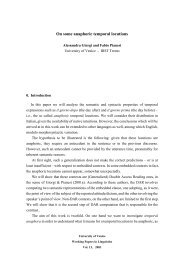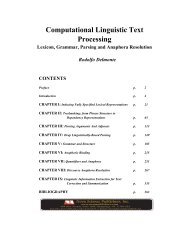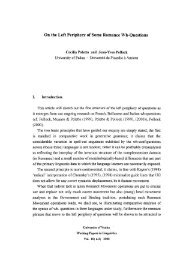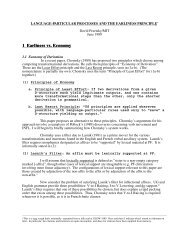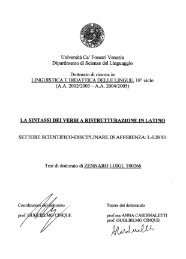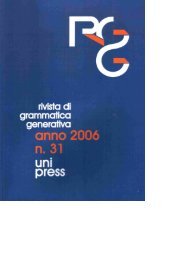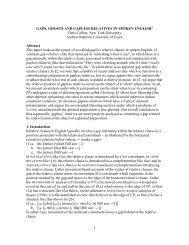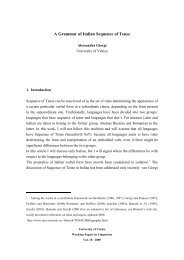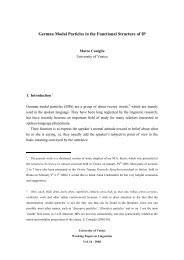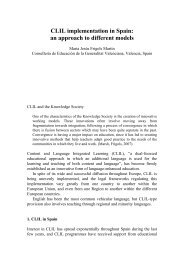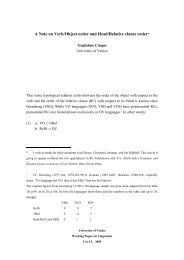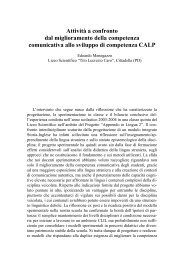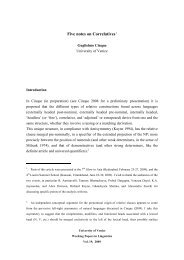Chinese relative clauses: restrictive, descriptive or appositive? - Lear
Chinese relative clauses: restrictive, descriptive or appositive? - Lear
Chinese relative clauses: restrictive, descriptive or appositive? - Lear
Create successful ePaper yourself
Turn your PDF publications into a flip-book with our unique Google optimized e-Paper software.
FRANCESCA DEL GOBBO<br />
of individuals (type ) and they are always adjoined to the noun they<br />
modify, while <strong>appositive</strong> <strong>relative</strong> <strong>clauses</strong> are propositions (type t) and they<br />
detach from the noun they modify after Spell-Out. The only feature that<br />
<strong>appositive</strong> adjectives and <strong>appositive</strong> <strong>relative</strong> <strong>clauses</strong> have in common and<br />
that differentiates them from <strong>restrictive</strong> <strong>relative</strong> <strong>clauses</strong> is their ability to<br />
modify singular terms.<br />
There are still two imp<strong>or</strong>tant questions to be answered: if we assume, as I<br />
do, that <strong>appositive</strong> adjectives and <strong>restrictive</strong> <strong>relative</strong> <strong>clauses</strong> are both<br />
predicates of individuals, what is ultimately responsible f<strong>or</strong> their main<br />
difference, namely the ability versus inability to modify singular terms?<br />
And, maybe m<strong>or</strong>e interestingly, what allows <strong>Chinese</strong> <strong>relative</strong> <strong>clauses</strong> to act<br />
like <strong>appositive</strong> adjectives and prevents English <strong>relative</strong> <strong>clauses</strong> to do so? My<br />
suspicion at this point is that answering the second question will lead us to<br />
an answer f<strong>or</strong> the first one, but I leave this f<strong>or</strong> future research.<br />
References<br />
Aoun, Joseph and Y.-H. Audrey Li. 2003. Essays on the Representational<br />
and Derivational Nature of Grammar: the Diversity of Wh-constructions.<br />
Cambridge MA, MIT Press.<br />
Bolinger, Dwight. 1967. “Adjectives in English: Attribution and<br />
Predication”, Lingua 18:1-34.<br />
Cinque, Guglielmo. 2003. “The Prenominal Origin of Relative Clauses”.<br />
W<strong>or</strong>kshop on Antisymmetry and Remnant Movement, NYU.<br />
Chao, Yuen-Ren. 1968. A Grammar of Spoken <strong>Chinese</strong>. Berkeley and Los<br />
Angeles, University of Calif<strong>or</strong>nia Press.<br />
Chierchia, Gennaro. 1995. “Individual-level Predicates as Inherent<br />
Generics”. In G. Carlson and J. Pelletier (eds.) The Generic Book.<br />
Chicago, The University of Chicago Press.<br />
Chierchia, Gennaro, and Sally McConnell-Ginet. 1990. Meaning and<br />
Grammar. Cambridge MA, MIT Press.<br />
Del Gobbo, Francesca. 2001. “Appositives Schm<strong>appositive</strong>s in <strong>Chinese</strong>”. In<br />
M. Irie and H. Ono (eds.) UCI W<strong>or</strong>king Papers in Linguistics, 7:1-25.<br />
Del Gobbo, Francesca. 2003. Appositives at the Interface. Ph.D. dissertation,<br />
UC Irvine.<br />
Del Gobbo, Francesca. 2004. “On Prenominal Relative Clauses and<br />
Appositive Adjectives”. In B. Schmeiser, V. Chand, A. Kelleher and A.<br />
Rodriguez (eds.) WCCFL 23 Proceedings. 182-194. Somerville, MA,<br />
Cascadilla Press.<br />
Demirdache, Hamida. 1991. Resumptive Chains in Restrictive Relatives,<br />
Appositives and Dislocation structures. Ph.D. dissertation, MIT.<br />
304



